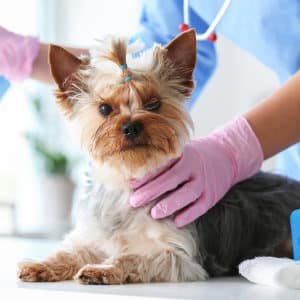Veterinary Compounding Medication
Compound medications aren’t only for humans
It’s true that medication for pets differs from what it is for humans. With veterinary compounding, our pets can also benefit from the customized treatment in more ways than the generalized means of treatment.
Just like medication varies among humans, similarly, each pet is unique when it comes to receiving treatment a certain way or show discomfort with one form of pill versus the other.
Veterinary compounding pharmacy for your pet can increase the effectiveness of their treatment by:
We know that pets are important family members, so you can be rest assured knowing that Vios meets or exceeds the strict standards of the Pharmacy Compounding Accreditation Board (PCAB) for creating veterinary compounds. Our compounding pharmacists are happy to consult with your vet about getting the best results for your pet.
Frequently Asked Questions
The most common form of pet compounded medication used in veterinary medicines are as follows:
- Oral capsules – The capsule may be easier for pets to swallow compared to other types of medication and one can easily mix it with the daily food they eat. Several ingredients or discontinued medication can be combined in the capsule making it more effective.
- Transdermal Medication – Transdermal medication is usually chosen for pets that refuses to take pills. Application of a medicine or drug through the skin is called as Transdermal Medication.
- Flavored Pet Medications – Medications are flavored in the food given to pets. Flavors like chicken flavor, fish flavor, peanut butter flavor, or banana flavored medication are used for pet medication.
- Tablets and Chews – These types of medication are specially designed to dissolve on the tongue of animals who find it difficult to swallow medicines. These medicines also come in the form flavors.
Veterinary Compounding Pharmacy can be defined as a pharmacist who makes compounded medication for pets in form of tablets, capsules, transdermal, flavored form, etc. These veterinary compounding pharmacists help make your pet medicine easier to administer as they add flavors or make it transdermal, tablets or make it in form of chews that can dissolve in their tongue. These compounded medications are made based on veterinarian’s prescriptions.
As every animal is different and has different needs, customized compounded medications play a very important role in the medical care of animals. Some animals or pets cannot ingest the medication in its commercially available form, this when a veterinarian with the help of a veterinary compounding pharmacist prepare customized medication in liquid form, or add flavors, in the form of a transdermal patch, or other forms, so that the animals can easily take the medication.
FDA says that veterinarians and pharmacists can compound animal drugs if the source of the active ingredient is a finished FDA-approved drug. FDA doesn’t allow compounding from bulk drug substances as they are not FDA approved and require special permissions.
Yes, the FDA does regulate the veterinary drugs used to make customized compounding medication for animals and the condition under which veterinarians can prescribe drugs for extra-label uses.
Pharmacists obtain veterinary-specific pharmacy training (including compounding) independently by continuing education as a part of their education. Whenever a veterinary doctor asks to make a compounded drug, they should specifically ask if the veterinary compounding pharmacist is specially trained for this job. At VIOS, all veterinary compounding pharmacists are specially trained and have specialized knowledge of veterinary compounding.
Yes, it is completely safe to use compounded medication on pet animals. The veterinary compounding pharmacist at VIOS is specially trained which makes the compounded medication made by them of very high quality and efficacy that also don’t have any harmful effects on animals.
No, you cannot as the compounded medication is specifically made keeping in mind your pet animal needs and the prescription provided by the Veterinarian. It may have harmful effects if consumed by other animals or pets, as this medication would not suit their body.









